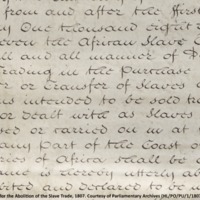
Heartbeat Riddim Chant
The dance-theatre production Heartbeat Riddim Chant was based on the horrors of the transatlantic slave trade. The production premiered at the West Yorkshire Playhouse in Leeds in July 2007, and mixed dance, live music and voice, including traditional Caribbean folk dancing blended with contemporary reggae. The show was choreographed by David Hamilton, and featured dancers from Regeyshun Dance and members of the community dance group Back Bone. There were also performances from youth dance groups and young voices from across Leeds, including LS7 Result, Northern School of Contemporary Dance, Gee4orce and Leeds Young Authors.
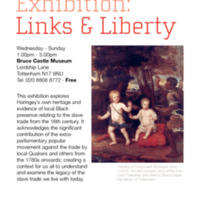
Links and Liberty
An exhibition at Bruce Castle Museum (in partnership with Euroart Studios) explored the transatlantic slave trade, Haringey's heritage relating to the trade and its legacy, and the historic Black presence in the borough from the 16th century onwards. There was a particular focus on the painting of Lucius and Montague Hare, sons of Lord Coleraine (former owner of Bruce Castle), with their African servant. The exhibition also looked at the extra-parliamentary popular movement against the trade by local Quakers such as Priscilla Wakefield and others. Contemporary dance workshops for secondary schools were led by dance company Movement Angol.
The Links and Liberty exhibition included 'Stolen', a life-size installation by artists at Euroart Studios (John Fowler, Lorraine Clarke and Nigel Young) of a section of a slave ship. School pupils were encouraged to climb inside to imagine conditions on board.
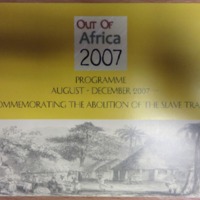
Out of Africa 2007
The African and African Caribbean Kultural Heritage Initiative (ACKHI) is a not-for-profit Black Afrikan-led community organisation, with the aim is to promote, protect and preserve the history, heritage and culture, of peoples of Black African heritage living or working in Oxfordshire. The Out of Africa programme of events in 2007 included an exhibition of books about slavery and the slave trade, which toured Oxfordshire libraries, and performances of African music and contemporary dance. The ‘Remembering Slavery’ commemorative service was held in Christ Church Cathedral. ‘Connections’ was a research project looking at Oxfordshire’s links to the system of slavery and the slave trade. ‘InTentCity’ was a visual arts project, in partnership with Fusion Arts, bringing together cultural groups, primary schools and artists to transform tents into works of art – one theme addressed was ‘Freedom’. Reflecting the legacy of the system of slavery and the slave trade, ‘Common Threads’ was an exhibition of textile work by the Textiles for Peace group, local women representing multi-cultural Oxfordshire. In ‘Ancestral Souls’, the African Women’s Art Collection (AWAC) collaborated with women of African descent to produce and exhibit 200 dolls to represent the diaspora of African peoples.
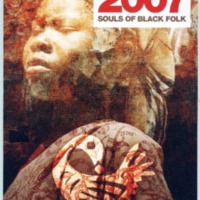
Black History Season Leicester 2007: Souls of Black Folk
Leicester's Black History Season in October-November 2007 marked the bicentenary of the abolition of the slave trade. Its aim was to redress the balance from a 'Eurocentric point of view' of abolition, and focus on the Afrikan perspective with the theme of 'Souls of Black Folk'. Musical performances included gospel, Motown, reggae and jazz. Other events in venues across Leicester and Loughborough included traditional South African dance, contemporary dance, performance poetry, comedy, multimedia performances, storytelling, theatre and an exhibition, 'Africa's Gift', focusing on the economic and cultural contributions of the slaves and their descendants.
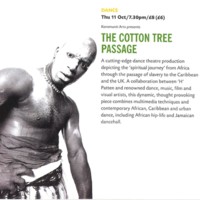
The Cotton Tree Passage
'The Cotton Tree Passage' was a dance theatre production by Koromanti Arts performed at The Drum in Birmingham as part of the Routes to Freedom season. The production depicted the spiritual passage of slavery from Africa to the Caribbean and the UK. A collaboration between 'H' Patten and dance, music, film and visual artists, this piece combined multimedia techniques and contemporary African, Caribbean and urban dance, including African hip-life and Jamaican dancehall.